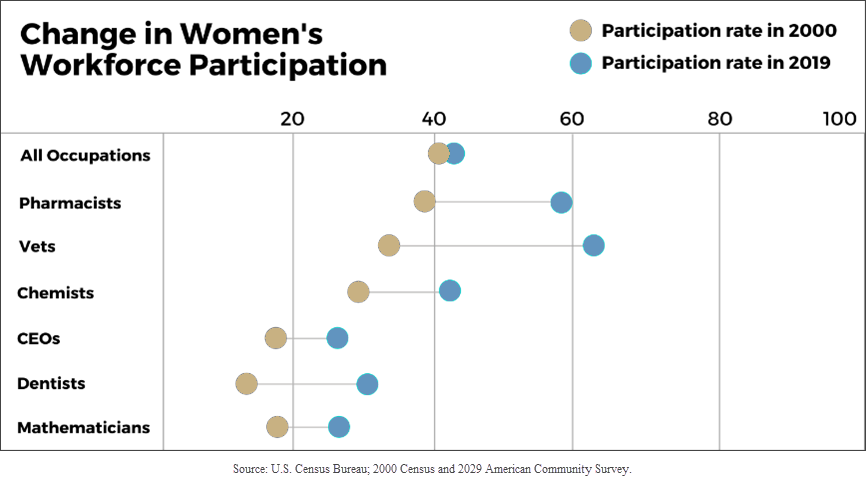
Women at all age levels are redefining how they think about their financial journey. This includes career paths, planning for flexibility, taking charge of family finances, or being successful on their terms.
There are some generational differences among Gen Z, Millennial, Gen X, and Boomer women—but not as much as you’d think. And two main differences that set them apart from men hold across generations:
- Women are better investors than men1
- Women are more likely to approach financial planning as a partnership with a trusted advisor2
- Women value a financial advisor that listens to them more than men do3
Women tend to outperform men partly because they are more patient investors and trade less. This results in better performance over time and lowers costs.
As to the second result, the easy reach is to point out the men are reluctant to ask for directions when driving too. But it’s a little more complicated than that, and the reasons why women seek financial advice change as they move through their lifecycle.
How they want to partner with a financial advisor is also different. Women want to be sure that the advisor listens to them and understands and respects their priorities.
Gen Z and Younger Millennials
Younger women (Gen Z and younger Millennials) are generally comfortable and confident about money and financial planning.
They’ve grown up with more salary transparency, the proliferation of money-related apps to help with budgeting and investing, and the optimism of youth. They are interested in financial planning that fits their busy lives. They make good salaries, still have debt, are single or newly partnered, and want to get a good foundation in place.
They gravitate to financial planners that offer the planning they need in a way that they can relate to. This includes cash-flow planning, debt reduction strategies, maximizing employee benefits, and above all – helping them improve their financial literacy.
This generation of women understands the value of starting early on the path to financial independence and wants financial planning advice that can help them build a solid foundation.
Older Millennials and Gen X

As women approach the mid-point of their careers, money becomes more complex.
Careers are in full swing, and growing wealth brings to the fore the costs of making a mistake.
These women may not have worked with a financial advisor before. Whether single or partnered, they realize that all the different pieces of their financial lives need to come together in a comprehensive plan.
For them, it’s about creating the option to stop work, scale back work, start a business of their own, or do more meaningful work that may not be as highly paid – while maintaining a current lifestyle and still save for financial goals in the future.
They realize the value of working with a financial advisor that can help them put together all the pieces of their lives:
- Equity compensation
- What to do with an annual bonus
- Tax planning
- Saving for education
- Taking the right amount of investment risk
- Buying a second home or income property
- Creating opportunity with their wealth
These women want a trusted partner that explains the “why” to them, and guides them to make choices that are right for them.
As things change, they value being able to make changes to a plan to accommodate new goals or different circumstances.
Older Gen and X-Boomers
These women are driving the decision to work with a financial advisor for themselves and their families. Very often, something has sparked the need to partner with a financial advisor to solve an immediate problem.
- A change of job
- A spouse’s health issue
- Aging parents
- Imminent retirement
- Death of a spouse
- Tax issues
Having a trusted partner to help them sort through the issue calmly in a non-judgmental way is paramount. They want someone to help them fix problems, provide solutions, and ensure that no other avoidable situations are on the horizon.
They may realize that a spouse has always done the financial planning and that it may be time for them to understand the specifics of their wealth. They may want to plan for a retirement that allows them the time they have always wanted with their family.
This group has the most anxiety around money and the least excitement.4 They need to develop trust and have an investment plan that helps them achieve their goals – without taking on too much risk.
The Bottom Line
Women are taking control of their and their families’ wealth at all points on the age spectrum.
They value working with a financial advisor, but they are clear in their need to have someone who listens, prioritizes their goals, is a trusted partner, and truly understands how they want to build and maintain wealth.
1.Fidelity 2021 Women and Investing Study.
2, 3, 4. U.S. Bank. Women and Wealth: Exploring the Gender Gap. 2021.
This work is powered by Advisor I/O under the Terms of Service and may be a derivative of the original.
The information contained herein is intended to be used for educational purposes only and is not exhaustive. Diversification and/or any strategy that may be discussed does not guarantee against investment losses but are intended to help manage risk and return. If applicable, historical discussions and/or opinions are not predictive of future events. The content is presented in good faith and has been drawn from sources believed to be reliable. The content is not intended to be legal, tax or financial advice. Please consult a legal, tax or financial professional for information specific to your individual situation.





